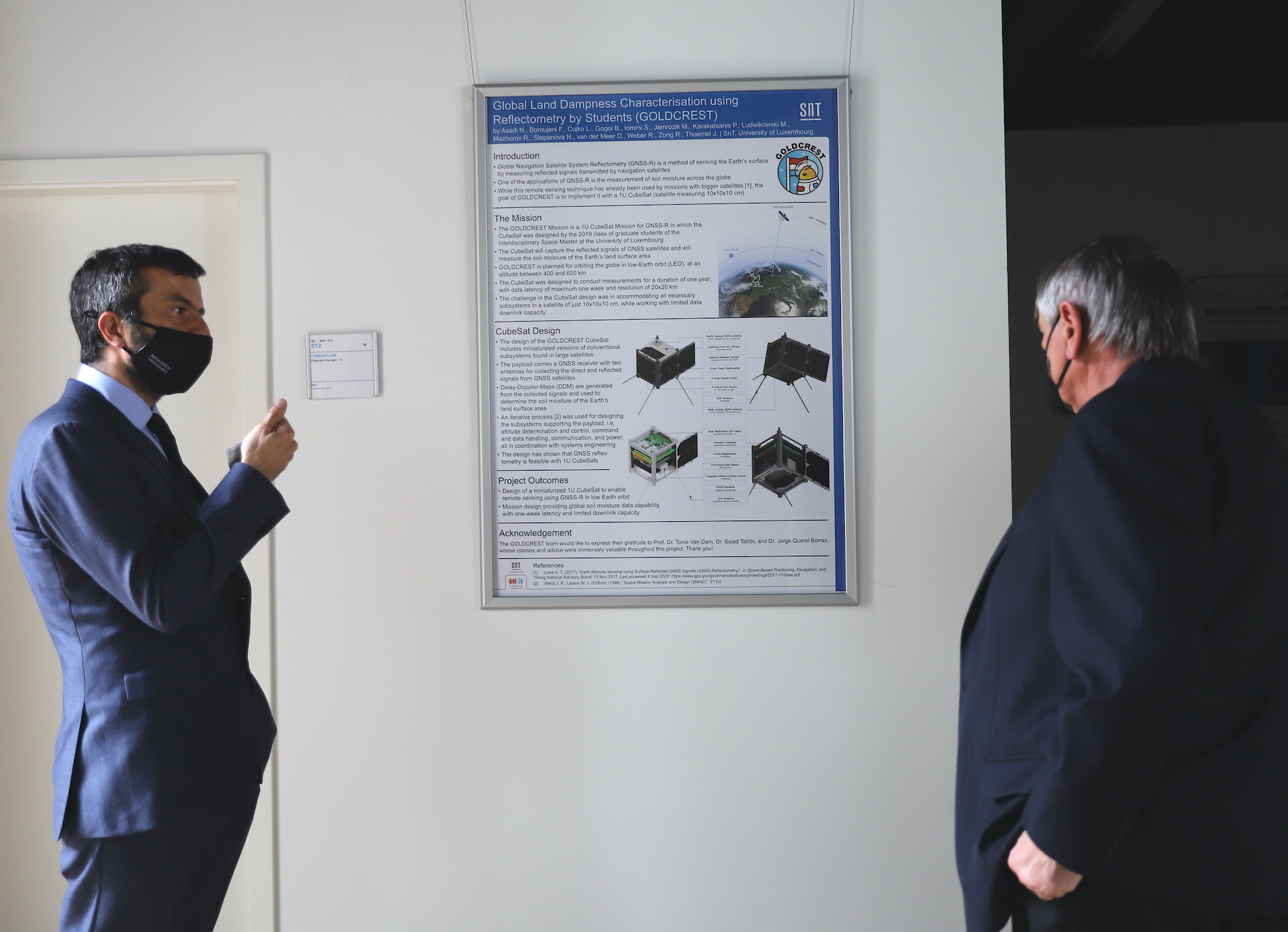Are we alone in the Universe? From a probabilistic perspective, that seems unlikely. If so, as Enrico Fermi famously asked, “Where is everybody?”. Countless scientists have been trying to answer this question with the help of advanced technology, but the undertaking is too massive for individual contributors, and time on the world’s most advanced telescopes is limited. With governments worldwide having more pressing problems to solve, funding efforts in this sense have been few and far between, often only relying on private initiatives. That is why, in 2015, the Breakthrough Prize Foundation launched a suite of comprehensive space science programs aimed at doing just that – search for signs of extraterrestrial intelligence in the Universe.
On May 17, the Interdisciplinary Centre for Security, Reliability and Trust (SnT) had the great pleasure of welcoming Dr. S. Peter Worden, Chairman of the Breakthrough Prize Foundation and former Director of the NASA Ames Research Center. SnT’s Director Björn Ottersten and a group of scientists led Worden through a visit of SnT’s space laboratories: the CubeSatLab, Concurrent Design Facility, SatComLab, LunaLab and the Zero-G Lab. The SnT scientists leading these facilities presented their research in the field of space systems, as well as the educational activities they conduct in the framework of the University’s Interdisciplinary Space Master (ISM). The Master was launched in 2019 together with the Luxembourg Space Agency and the Ministry of Economy.
After visiting the labs, Worden held a session entitled “Search for Life in the Universe” to present the Breakthrough Initiatives, the space research programmes of the Breakthrough Prize Foundation. The privately-funded Foundation behind the Breakthrough Prize, assigned annually to top scientists working on mankind’s biggest questions, was founded in 2012 by Sergey Brin, Priscilla Chan and Mark Zuckerberg, Yuri and Julia Milner, and Anne Wojcicki. As a whole, the Breakthrough Initiatives aim to explore the Universe, seek scientific evidence of life beyond Earth, and encourage public debate from a planetary perspective through four main programmes:
- Breakthrough Listen – a $100 million programme of astronomical observations and analysis. Using time on the world’s largest and most advanced telescopes, the programme looks for technosignatures – scientific evidence of technology beyond Earth – by surveying targets across one million nearby stars, the entire galactic plane and 100 nearby galaxies over radio and optical frequency bands.
- Breakthrough Watch – a multi-million-dollar, Earth- and space-based astronomical programme to identify and characterise Earth-sized, rocky planets around Alpha Centauri and other stars within 20 light years of Earth, in search of oxygen and other potential signatures of primitive life.
- Breakthrough Starshot – a $100 million programme aimed at developing a proof-of-concept for ultra-light, uncrewed space flight at 20% of the speed of light, laying the foundation for a fly-by mission to Alpha Centauri, the planetary and star system closest to our own Solar System.
- Breakthrough Discuss – an annual academic conference about the search for life in the Universe.
The Breakthrough Initiatives are led by four respective scientific committees constituted by renowned authorities in the fields of astrophysics, astrobiology, space systems engineering, satellite communications, and several other disciplines. So far, the initiatives have already achieved impressive results: the successful launch of the world’s smallest spacecraft, the analysis of petabytes of data from telescopes, the launch – in collaboration with the European Southern Observatory (ESO) – of a new instrument for the Very Large Telescope (VLT) to identify Earth-like exoplanets, and more.
Two interesting research results – still under investigation – were recently shared in the framework of Breakthrough Listen and Breakthrough Watch. The first, announced in December 2020, was the detection of a signal, Breakthrough Listen Candidate 1 (BLC1) coming from Proxima Centauri, which passed the programme’s basic tests to qualify as a technosignature, though the scientists leading the analysis strongly suspect the signal to be the result of human interference. The second is the result of initial observations carried out at ESO’s VLT in the framework of Breakthrough Watch, namely the detection of a weak signal indicating the presence of a “plausible exoplanet” in the habitable zone of Alpha Centauri A. These findings have been published on Nature in February 2021.

Dr. Jan Thoemel, Head of the CubeSatLab, presents a satellite mission designed by ISM students to Dr. Worden
After the session, Worden answered questions from our scientists about the Breakthrough Initiatives and the latest developments in the NewSpace sector. When asked by the Head of the CubeSatLab Dr. Jan Thoemel to share his tips for the graduating ISM students, Worden underlined the importance of working with purpose, and that of finding compatible partners for entrepreneurial ventures. “I worked with a lot of start-ups, and when you establish a team, the important thing to remember is that you’re going to see them a lot more than your own family, so make sure you pick people you’re compatible with,” he said.
When it comes to projects, he advised, “There’s three questions: what is it that you’re gonna do, how you’re gonna do it, and the most important one – why you’re doing it. And if you don’t get that why right upfront, [the project] is not going anywhere. I always wanted to build starships.”
Coming Soon: Asteroid Day LIVE 2021. Asteroid Day is an educational programme, run in Luxembourg by the Asteroid Foundation. From 1 June – 4 July, Asteroid Day TV is showing original films, series and learning programmes to help educate people of all ages on the role of asteroids in our solar system, as well as how we protect our planet from impacts. Asteroid Day LIVE will take place on 30 June and will feature interviews with key figures from the space missions of yesterday and tomorrow. Find out more information here.
